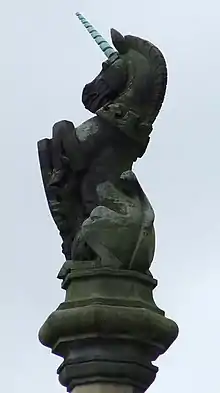Margaret Cross Primrose Findlay
Margaret Cross Primrose Findlay (1902–1968) was a Scottish sculptor and modeller.[1]
Margaret Cross Primrose Findlay | |
|---|---|
| Born | 1902 Glenlivet, Banffshire |
| Died | 1968 (aged 65–66) Bearsden, Dunbartonshire |
| Nationality | British |
| Alma mater | Glasgow School of Art |
| Known for | Sculpture |
Biography

Findlay was born at Glenlivet in Banffshire and trained at the Glasgow School of Art under Archibald Dawson between 1920 and 1925.[1][2] After graduation she taught at the Beacon School at Bridge of Allan and then at Hillhead High School in Glasgow.[2]
Findlay was the modeller for the Mercat cross in Glasgow, carving the wooden animals.[3] The Mercat Cross is considered a significant artistic triumph for Scottish women, as Findlay worked on it with Edith Burnet Hughes, the first practising female architect in Scotland.[4][5]
From the mid 1920s to the mid 1930s, Findlay created several works including "Cobler (1927), The Bathers (1928), Gossip (1928), Head of a Baby (1930), Dancers (1931), King of the Castle (1931), Shy (1934) and Morning Song (1935)".[6] For the 1938 Glasgow Empire Exhibition she created a frieze of figures.[2]
Exhibitions and Awards
Findlay's work was exhibited at the Royal Glasgow Institute of the Fine Arts and the Royal Scottish Academy in Edinburgh.[7][2] In December 1928, Findlay was awarded the Guthrie Award by the Royal Scottish Academy.[6][2]
References
- Tim Gardner. "Margaret Cross Primrose Findlay (1902-1968), sculptor, a biography". www.glasgowsculpture.com. Retrieved 23 May 2018.
- David Buckman (2006). Artists in Britain Since 1945 Vol 1, A to L. Art Dictionaries Ltd. ISBN 0 953260 95 X.
- "PMSA". www.pmsa.org.uk. Archived from the original on 24 May 2018. Retrieved 23 May 2018.
- "Women of the Merchant City" (PDF). Glasgow Women's Library. Retrieved 23 May 2018.
- "Calton Heritage Trail". Glasgow City Council. Retrieved 23 May 2018.
- "Miss Margaret C. P. Findlay". Mapping the Practice and Profession of Sculpture in Britain and Ireland 1851-1951. Retrieved 14 October 2019.
- "The Royal Scottish Academy, Edinburgh, Scotland". The Royal Scottish Academy, Edinburgh, Scotland. Retrieved 23 May 2018.